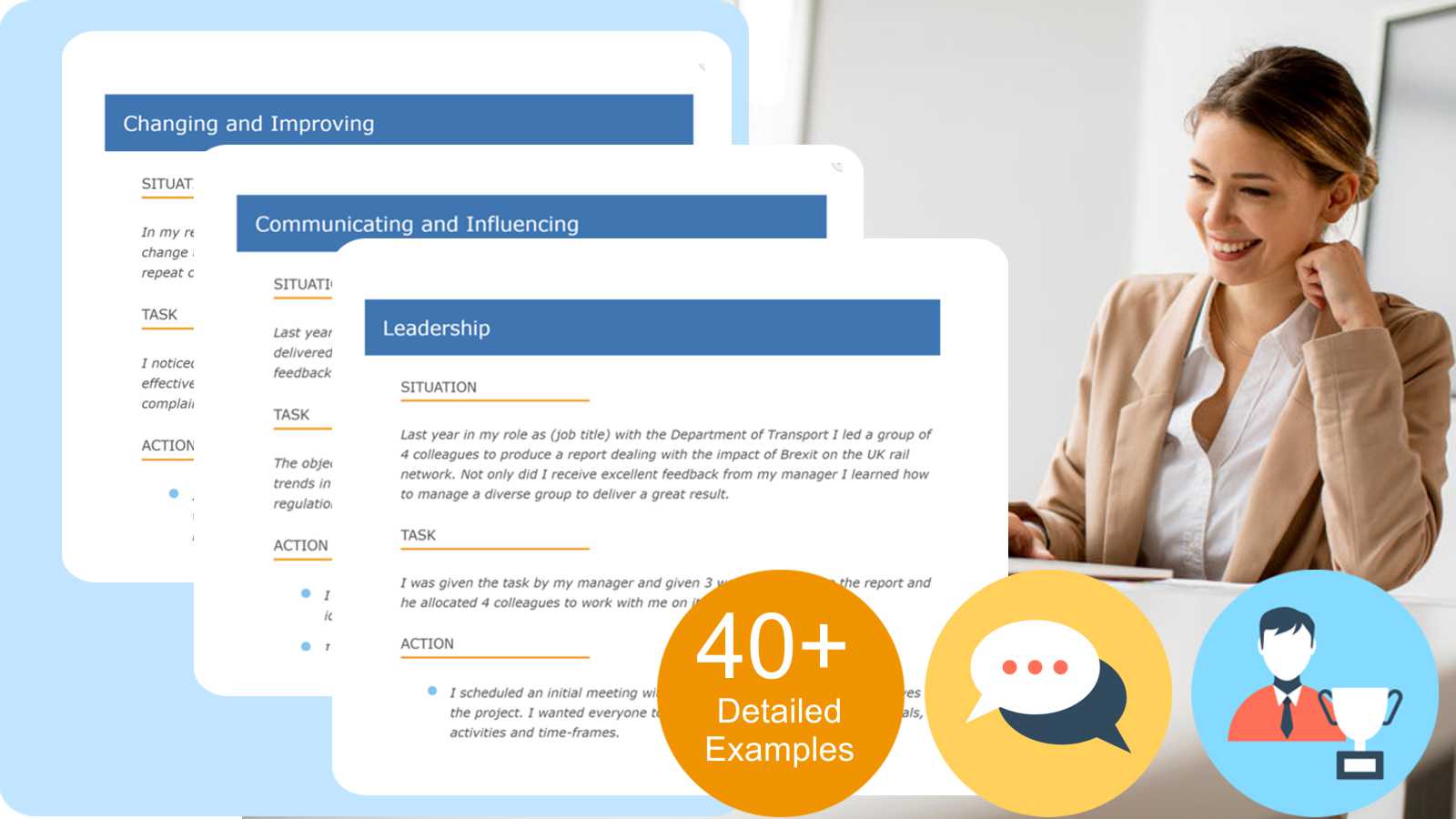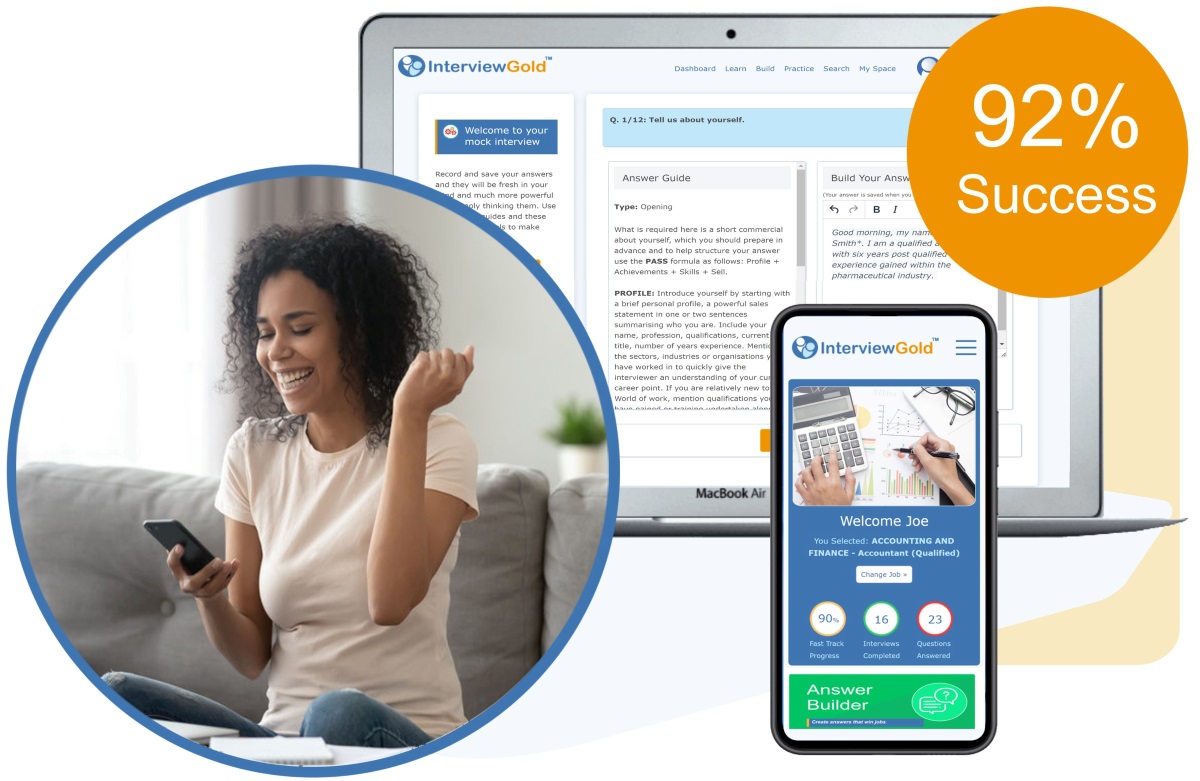
Are you invited to take part in a strength based job interview? Perhaps you have been told you will be asked strengths based interview questions as part of your recruitment process?
Many employers, such as the Civil Service, Government, NHS, major banks and consultancy firms are moving away from solely using competency based or traditional interviews. They are also using strengths based interviewing or a blended approach, one part of which will assess your strengths.
In this guide, we teach you all about strength based interview and we take you though some of the most common strength based interview questions they can ask.
What is a Strength Based Interview?
In simple terms, a strength based interview is one where you will be asked direct questions exploring what your core strengths, skills and interests are. They want to find out what you are inherently good at, what makes you excited, what you love doing.
Supporters of strength based interviews argue that when we are doing something we enjoy, we become totally engaged in the task and are oblivious to time passing. In essence, engaging in activities aligned with one’s passions and natural abilities leads to increased productivity, diligence and success.
What Are Strengths in a Work Context?
In simple terms, strengths are the things that we do regularly, do well and that motivate us. When looking at your strengths, an employer is interested in capability and compatibility; will your skills be useful, will you enjoy the job role and are you a good fit overall.
When we talk about strengths, we refer to the personal qualities, attributes or skills that you possess and that you use in a work environment.
Examples of strengths include: Adaptability, Analytical Skill, Numerical, Organised, a Problem Solver etc
How Strengths are Assessed in an Interview
During the recruitment process strengths can be assessed in a number of ways, including via the application form, a face to face or a video recorded interview or some form of test or assessment.
Within an interview situation you will be asked a series of questions, some direct strength based and others competency or behavioural based and focused on finding out whether you have the skills required for the role. In other words, do you have what it takes to perform the role successfully?
There will be some focus on where your energy is when answering. For example, when talking about a past achievement that you truly enjoyed you may speak a little higher, you might be more animated and you may demonstrate excitement. From this the interviewer will determine which activities you most enjoy and as a consequence are better suited to.
Different Types of Strength Based Interviews
Your interview may be fully focused just on exploring the strengths required.
A more likely alternative is where you are asked strengths based questions in combination with others. These are often referred to as blended interviews, where you are asked a mix of traditional, competency / behavioural as well as strengths questions.
Formats can vary between department and level and here are some recent variations reported this year so far.
Strength Based Pre-Recorded Video Interview: You may be asked to take part in a recorded video interview which is focused on exploring the strengths required in the post you have applied for. The interview may begin with an opening question, perhaps one of the top 10 questions and then move onto a series of strength based questions.
Learn more about pre-recorded and video interviews here.
Using Strength Based Question to Baseline: Some departments are using strength based questions to baseline your responses. They will ask one or two questions at the start of the interview, and they will measure your energy and enthusiasm when answering. They will then assess subsequent questions against this.
Quick Fire Strength Based Questions: You may be asked a series of 6 to 8 strength based questions at the start or at the end of your blended interview. They will usually have a yes or no answer and will be targeted at the core strengths required in the role.
Get Expert Answers for Your Target Job
Get Instant Access to InterviewGold and Get The Job You Want
8 Common Strength Based Interview Questions with Answers
Strength based interview questions are designed to learn about you as a person, what skills you have. They can be framed in many ways, such as explicitly asking you to talk about your hobbies and extra-curricular interests, or more generally as an invitation to explain what gives you pleasure in life.
Here are 8 common strengths based questions with sample answer snippets.
In your interview or application, please note you will need to expand your answers giving examples as evidence.
1. What motivates you?
Interviewers will once again be looking to see that you have passions and interests, but this time will want to see you explain what gets you excited about an activity or project. Whether it is having a clear idea of the end goals you want to achieve, or being given a blank slate and the opportunity to get creative in the way you tackle a problem, consider the kind of framework that makes you most energised.
Sample Answer: “I am motivated by the opportunity to make a meaningful impact. Contributing to a team or project’s success, solving challenges, and continuously learning drive my enthusiasm. Recognition for hard work and the chance to grow professionally inspire me to consistently strive for excellence and embrace new opportunities.”
2. What is your proudest achievement?
With this question they want to hear you discuss something about which you are passionate. The examples you choose is important of course but they will also be listening to your tone of voice, the excitement in it and how you convey your enthusiasm. A story about volunteering during a gap year or in your private time is great however better to choose an achievement from work.
Sample Answer: “My proudest achievement is spearheading a cross-functional project that significantly streamlined processes, resulting in a 20% increase in team efficiency. Collaborating with diverse team members, overcoming challenges, and delivering impactful results not only showcased my leadership skills but also contributed to the overall success of the organisation.” [Continue with your answer using the STAR method to structure it.]
3. Which of your strengths will be most relevant to this?
This may seem like another back-to-basics interview question, but it has to be handled in the context of the strengths required in the role. Study the job description and discover the strengths and skills required. Researching the organisation and studying the personal attributes which are necessary for the role will also help you formulate a response ahead of time.
Sample Answer: “I have studied the job description in detail and I would say that my strengths that align most with the role on offer include effective communication, problem-solving, and adaptability. These skills have been crucial in my previous roles, allowing me to collaborate seamlessly with diverse teams, address challenges efficiently, and adapt to dynamic work environments. I am confident they will contribute positively to this position.”
4. What are your natural talents?
This is the same as asking ‘what are your strengths?’ Whatever skills you may have acquired over your time in education or as part of past professional posts, a strengths based interview is designed to look past them and explore more of what is unique about your personality and innate abilities. This question is the perfect example of that, not only allowing you to talk about what you are good at, but also to demonstrate that you understand where your talents lie.
Sample Answer: “From my experience over the past two years working in a dynamic customer service team, I know that my natural skills include strong analytical skills, effective communication, and adaptability. These talents have consistently allowed me to approach challenges with a strategic mindset and to overcome obstacles. My ability to communicate complex information clearly has been excellent when dealing with clients. I love working in a fast moving environment and I know I can adapt and learn quickly, something which I am aware I can use to really contribute to this post.”
5. What skills would you say that you need to develop most?
This question refers to weaknesses, a topic that has always been discussed in job interviews. In this case, you will need to cover both what problems you might have and how your strengths can be used to counterbalance them, whether in the workplace or in daily life. If you find it hard to juggle your schedule and get things done on time, say so, but weigh this against the steps you have taken to account for these failings.
See here how to answer questions about weaknesses and get sample answers.
6. In what environment do you feel most comfortable?
Some people thrive when working in teams, while others consider themselves more effective when going solo. This question will involve explaining which scenarios play to your particular strengths, but not in the way you might think. This is not just about preferred working practices; it also factors in explaining the situations which will make you relaxed, content and productive rather than on edge and stressed. When answering, be honest. After all you want to end up in a role which you will enjoy.
Sample Answer: “I would say that I feel most comfortable in a collaborative and dynamic environment where open communication and teamwork are valued. I find from my recent job with the Department of Transport that such an atmosphere fosters creativity and allows for the exchange of diverse ideas. I thrive when surrounded by supportive colleagues who appreciate the importance of mutual respect and shared goals. Additionally, for me an environment that encourages continuous learning and growth aligns with my professional ethos. I find that these conditions not only enhance my individual performance but contribute to a positive collective synergy. I am able to successfully get things done faster and more effectively. Overall, I am at my best when working in an inclusive and stimulating environment that values both individual contributions and team collaboration.”
7. With tasks and projects, do you prefer to start or finish them?
Most people fit into one of a number of categories when it comes to working. Some love to initiate and start new things while others love the process of just doing. Others might just want to get the job done and are called finishers. All have an important part to play, there is no single correct answer to this one.
Sample Answer: “That is a tough question, but I have thought about this before. I have to say, I find enjoyment in both starting and finishing tasks and projects. Initiating a project allows me to set a strong foundation, establish clear goals, and devise a strategic plan. This is something I enjoyed recently when managing a training project with my current employer. On the other hand, completing a task brings a sense of accomplishment and fulfilment. I strive to maintain a balance by being proactive in initiating projects and disciplined in seeing them through to successful completion. This approach ensures a comprehensive understanding of the entire project lifecycle, from inception to execution, and allows me to contribute effectively at all stages.”
8. How would you describe a good day?
This is another open-ended question, exploring once again what you enjoy, what make you feel good at the end of the day. Great to talk about a task outside of work but even better to talk about the things you can achieve in your work environment.
Sample Answer: “A good day for me is one where I’ve made a positive impact, either by overcoming challenges, contributing to team success, or learning something new. Achieving a sense of accomplishment, connecting with colleagues, and fostering a positive work environment all contribute to a fulfilling day. Additionally, personal growth, whether through skill development or meaningful interactions, makes a day truly satisfying. Ultimately, a good day is characterised by a sense of purpose, productivity, and the opportunity to celebrate achievements, both big and small.“[give an example which illustrates this.]
Perfect Answers: Know What To Say to Win Your Next Job
Direct Strength Based Interview Questions
To date we have found that the interview questions exploring strengths can be classified as direct or competency based. The former are easier to understand and are straightforward while the latter can be more complex.
First, lets look at some direct strength based questions.
- What are your strengths?
- What are your weaknesses?
- What has been your greatest achievement?
- Which tasks do you get the most satisfaction from?
- How would you describe yourself?
- How would your friends / colleagues describe you?
- What motivates you?
- Talk to us about the movie you saw or the book you read?
Competency Based Interview Questions Exploring Strengths
We deal with competency based interview questions in detail here however here are some which explore strengths.
- Describe a time when you had to be flexible in your approach in order to achieve results.
- Talk us through your greatest achievement.
- Talk us through a recent situation, a task or activity that gave you great enjoyment.
- Describe a time when you achieved something you were especially proud of.
- Tell us about a time when you failed to complete a task on time.
- Describe the most important project you have been involved with.
As you can see, these competency questions are more subtle, with a focus on how you have performed in the past.
How To Answer Strength Based Interview Questions
Quite often the advice is to answer honestly and openly. To a point this is correct, after all you do not want to end up in a job for which you are unsuited.
However, we always suggest you focus your answer with laser precision. For example, while there may be activities you enjoy, that you are good at however if they are not required in the role, you will find it difficult to score highly with them.
Better to focus on those which are essential and which you have a proven track record with instead. It is all about being honest but putting the emphasis on the right strengths, the ones they want to hear about and not those which you like to talk about.
Here are our key guidelines when answering strength based interview questions.
Identify your strengths
Even though we all have strengths, many of us do not know what those are. Ask yourself what have you done exceptionally well, what have you enjoyed doing and what have you found difficult. Think also about your extracurricular activities and accomplishments as these will also indicate where your true passion lies.
Identify the strengths they are looking for
This is vitally important as it will tell you what strengths to talk about. Keep in mind you may have a long list of strengths you have identified however you will have limited time and will only be able to detail some of these in your answer.
They may list the strengths required, usually between four to six in which case you can skip forward and carry to on to step creating your stories.
Analyse the Job Description and the Competency Framework and research the employer to determine what types of strengths they are looking for. Examine what the their values and culture is. Reviewing the mission statement can also help spot what they value, the skills the company seeks.
Think of any life experiences that highlight those skills in your life; examples of these would be hobbies, achievements, past jobs and volunteer work.
If the above does not prove fruitful then have a look at other similar jobs online and pick out the key skills and strength listed.
Make a Match
When you have identified your strengths you need to then complete a matching exercise as follows:
• Their needs – Match your strengths to those they are looking for. Make sure that you meet their top 5 strengths, the ones they regard as essential as these are the ones you will focus your answer on.
• The competency framework – similarly match the strengths they need and you have to the competency framework. For example, for the competency Leadership, required strengths are Confident, Change Agent, Inclusive, Motivator, Team Leader and Visionary. Are these also your strengths?
Create your STAR stories
When you know the strengths they look for and are likely to examine you on, you are now ready to create your story. Use the Competency Answer Builder, give an example using evidence drawn from any part of your life, work, study or interests.
Remember to use the STAR or IPAR formulas and your research and the exercise above will help you decide which example to use and what to include in it. The actions should detail not just the key strengths required but also how you used them and what you found enjoyable and engaging while completing the task or project.
Discover Brilliant STAR Answers with InterviewGold and Get The Job You Want
Preparing for your next job interview can be a breeze with InterviewGold
With our online interview training program you will learn how to answer the trickiest questions with ease. Plus you will get detailed sample STAR answers all proven to boost your chances of winning the job.
Best of all, it is tailored to your target career. Log in select your sector and then select your role and get accurate questions and answers plus tons of top advice. Over 20 sectors are covered including Accounting, Finance, Customer Services, Banking, Marketing, Sales etc.
Pass Your Strength Based Interview With Expert Answers
Get Instant Access to InterviewGold and Get The Job You Want


